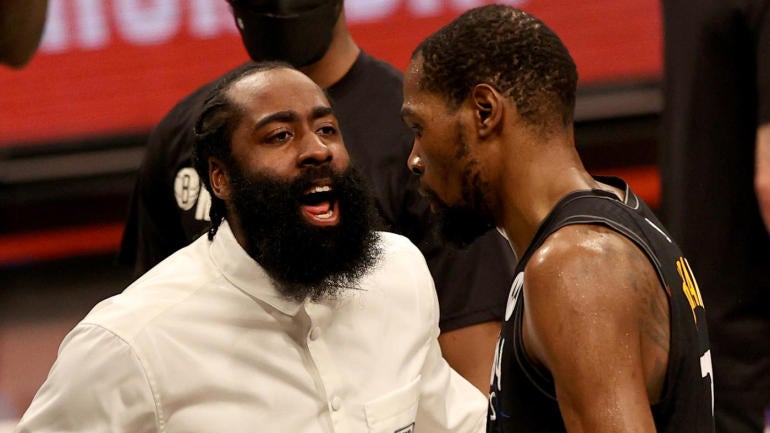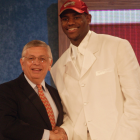
NEW YORK -- Mere days ago, before the Brooklyn Nets clobbered the Milwaukee Bucks twice in increasingly violent fashion, people wanted to know about DeAndre Jordan. A reporter asked Nets coach Steve Nash about the veteran center at practice last Friday and again just before tipoff on Saturday. Jordan had started all three of the regular-season matchups, including a pair in Milwaukee in early May. Aside from a handful of minutes in Denver, he hadn't played since.
Nash was coy. He said Jordan was "in play," but that it was a "see-how-it-goes" situation. In Brooklyn's 125-86 victory on Monday, which featured a full nine minutes of garbage time, Jordan -- the largest player on the roster, the lone "true" center after the James Harden trade sent Jarrett Allen to Cleveland and the sudden retirement of LaMarcus Aldridge -- was the only Net who didn't take the court. No one is asking about him now.
A less resolute coaching staff might have started Jordan in Game 1. When he was on the court this season, the Nets were an above-average defensive rebounding team; when he was on the bench, they were a horrendous one. He can catch lobs, set solid screens and call out every play the opponent is running. Jordan could have reprised his role as the primary defender against Giannis Antetokounmpo, in which his job was to stay between the back-to-back MVP and the paint, essentially daring him to settle for jumpers. Instead, Nash has continued to bet on speed, spacing and switching over size and strength.
The Nets are getting everything they could have hoped for out of Blake Griffin, who began his career next to Jordan as a traditional power forward in Los Angeles, evolved into an All-NBA point forward in Detroit and has recently reinvented himself as a smallball 5. Bruce Brown, the point guard turned point center, is thriving as a roll man and wreaking havoc on the defensive end. Nicolas Claxton, who still only has 54 games of NBA experience on his résumé, these playoffs included, looks as versatile as ever. It hasn't even mattered that Brooklyn has been without glue guy Jeff Green.
Had they played Jordan, the Nets would have effectively limited themselves to traditional pick-and-roll coverage and 4-out offense, at least when Jordan isn't being used in "Delay" action at the top of the key. Brooklyn might have been able to win playing that way, but it would have been easier for Milwaukee to park center Brook Lopez in the paint on defense, free its shooters and force the Nets to make difficult rotations. If styles make fights, then why would Brooklyn accept the Bucks' preferred terms of engagement? By committing to the switching scheme they've been working on all season, they have turned an elite regular-season offense into a shell of itself.
"I think we're just playing into their hands, playing one-on-one," Milwaukee's Khris Middleton said. "I think that's what switching does. It forces you to get out of your sets and play one-on-one. We still gotta find a way to be aggressive, drive the ball and play with the pass a little bit more."
The Nets are not an incredible defensive team, but Joe Harris said they'd played "some of the best possessions, quarters that we've had all season" in terms of intensity and attention to detail. When Antetokounmpo missed a turnaround jumper against Griffin early in Game 2, Lopez managed to tap the rebound back out to the perimeter, setting up another Antetokounmpo isolation. Brown executed a picture-perfect dig when Antetokounmpo went into his spin move, then rocketed back to the perimeter to contest Middleton's 3-pointer. It was as if he were in two places at once.
Lopez and Jrue Holiday essentially chalked up the Bucks' poor shooting in the series opener to bad luck, both insisting that they'd be better the next time. The truth, however, is that they didn't value possessions. They were even worse in Game 2, after which Holiday lamented that they "became a little bit too selfish," took "tough shots, contested by, two, sometimes three people" and missed most of their 3s "because we didn't have that many wide-open ones."
Brooklyn is having no such problems against Milwaukee's defense. The Bucks have messed around with a switch-everything scheme this season and varied their coverages much more so than previous years. They're still more comfortable, however, dropping their bigs deep in the paint. In the first round against the Miami Heat, they were able to neutralize Jimmy Butler and Bam Adebayo that way. That doesn't work against Kevin Durant and Kyrie Irving.
The Nets are making Milwaukee pay for relying heavily on Lopez, backup big Bobby Portis and guard Bryn Forbes. Brown said he loves when teams put centers on him because he knows they'll drop and a good screen will create an easy look every time.
With Forbes on him, Nets sharpshooter Landry Shamet screened for stars and three separate times got an open 3 out of it.
"They got everything they wanted, whichever way they wanted it, whether it was with the drives, with the ISOs, with the swings and extra passes," Middleton said. "We gotta find a way to eliminate most of those things, just force them to wherever we want them to go instead of them dictating it on the offensive end and on the defensive end."
This is why some analysts questioned the Forbes, Portis and Jeff Teague signings and coach Mike Budenholzer's relative reluctance to use P.J. Tucker at center. Unlike the Los Angeles Clippers, the Bucks cannot easily take their small point guards and bigs out of the picture for long stretches, particularly with Donte DiVincenzo sidelined. Their struggles, however, cannot be pinned solely on roster construction. Not when the Nets are missing Harden. Not when Milwaukee is failing to punish them for playing Irving, Shamet and Mike James together. Not after the shorthanded Boston Celtics targeted Brooklyn's weaker defenders much more effectively.
The disappointing part is that Milwaukee was supposed to be different this time. It made an enormous investment in Holiday, traded for Tucker, tweaked the offense and experimented on defense in an effort to be more playoff-ready. When Budenholzer threw out a 2-3 zone in the second quarter Monday, the gambit felt just as desperate as the ill-fated forays into switching in the 2019 conference finals. The Nets deserve immense credit for bending the Bucks to their will, but they're not doing anything Milwaukee hasn't seen before. There is no excuse for being this flummoxed. If Budenholzer does not find some solutions before Game 3 on Thursday, he will face extremely difficult questions.
One hypothetical to ponder in between now and then: If Budenholzer's staff were coaching Brooklyn's roster, would Jordan have started Game 1?
![[object Object] Logo](https://sportshub.cbsistatic.com/i/2020/04/22/e9ceb731-8b3f-4c60-98fe-090ab66a2997/screen-shot-2020-04-22-at-11-04-56-am.png)


















